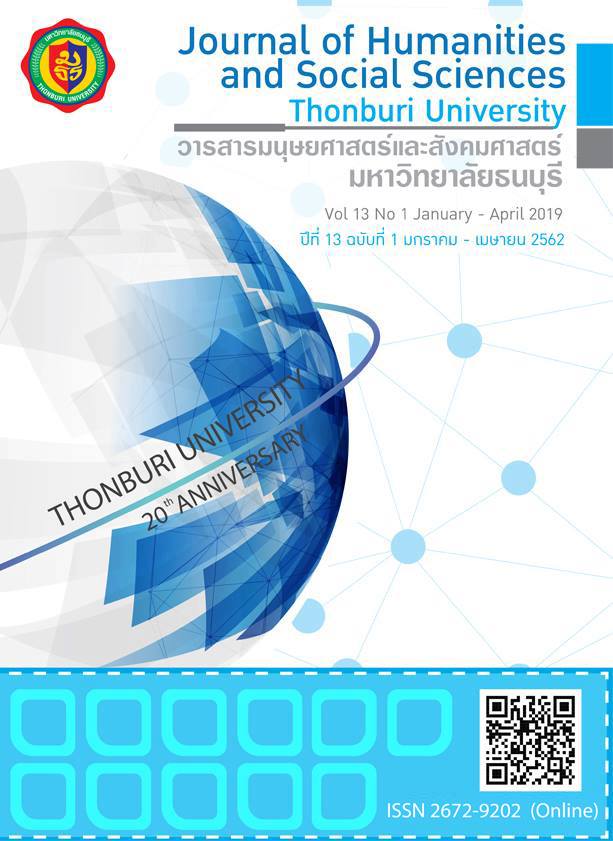อริยสัจ 4 กับการพัฒนาองค์การ
คำสำคัญ:
อริยสัจ 4, กิจในอริยสัจ 4, มรรควิธี, การพัฒนาองค์การบทคัดย่อ
บทคัดย่อ
บทความนี้มุ่งแสดงให้เห็นถึง การนำหลักพุทธธรรมขั้นสูงสุด มาประยุกต์ใช้ในการดำเนินชีวิต และการทำงานด้านการพัฒนาองค์การ ซึ่งหลักธรรมดังกล่าว เป็นแนวคิดที่วางอยู่บนรากฐานของเหตุและผล เป็นแก่นคำสอนของพุทธศาสนา ที่รู้จักกันโดยทั่วไปนั่นคือ อริยสัจสี่ โดยหลักธรรมนี้มีความมุ่งหมาย ที่จะสอนให้บุคคลเข้าใจถึงความเป็นจริงตามธรรมชาติของสรรพสิ่งทั้งมวล ซึ่งกล่าวถึงการที่จะต้องกำหนดรู้ให้จงได้ ว่าความทุกข์หรือปัญหานั้นคืออะไร และสาเหตุของปัญหาที่เกิดขึ้นอยู่ในขณะนั้น มีที่มาหรือเกิดจากสาเหตุอะไร อีกทั้งทำอย่างไร ด้วยวิธีการ หรือใช้เครื่องมือใดในทางปฏิบัติ จึงจะทำให้ปัญหาดังกล่าวทั้งหลายหมดสิ้นไป ซึ่งหากนำหลักธรรมดังกล่าวมาประยุกต์ใช้ จักทำให้บุคคล หรือองค์การ สามารถดำเนินชีวิตและประกอบธุรกิจ ได้อย่างสอดคล้องกับสภาพความเป็นจริงทั้งของชีวิตและการดำเนินงาน หรืออีกนัยหนึ่ง ความรู้แจ้งในหลักธรรมเหล่านี้สามารถช่วยบรรเทาความทุกข์ และลดทอนผลกระทบจากปัญหาที่เกิดขึ้นลงได้ โดยอริยสัจ 4 นี้ ประกอบด้วย ทุกข์ หมายถึงตัวปัญหา สมุทัย หมายถึงเหตุของปัญหา นิโรธ หมายถึงความดับสิ้นของปัญหา และมรรค ซึ่งหมายถึง หนทางปฏิบัติในการกำจัดปัญหา สำหรับส่วนที่สำคัญของบทความนี้คือ การอธิบายถึงการนำหลักธรรมนี้ไปประยุกต์ใช้ เทียบเคียงกับกระบวนการ และเครื่องมือพัฒนาองค์การในส่วนต่างๆ คือ 1.ด้านกระบวนการเชิงมนุษย์ 2.ด้านโครงสร้างและเทคโนโลยี 3.ด้านการจัดการทรัพยากรมนุษย์ และ4.ด้านการเปลี่ยนแปลงเชิงกลยุทธ์
คำสำคัญ : อริยสัจ 4, กิจในอริยสัจ 4, มรรควิธี, การพัฒนาองค์การ
เอกสารอ้างอิง
ชมพูนุท ศรีจันทร์นิล. (2552). จิตวิทยาแนวพุทธ: แนวทางเพื่อการเยียวยาและพัฒนาจิตใจมนุษย์. วารสารวิชาการ มหาวิทยาลัยหอการค้าไทย. 29(4): 188-208.
พระธรรมปิฎก (ป.อ.ปยุตฺโต). (2538). พจนานุกรมพุทธศาสตร์ฉบับประมวลศัพท์. พิมพ์ครั้งที่ 8. กรุงเทพฯ: มหาจุฬาลงกรณ์ราชวิทยาลัย.
พระธรรมปิฎก (ป.อ.ปยุตฺโต). (2541). ประโยชน์สูงสุดของชีวิต. กรุงเทพฯ: ธรรมสภา.
พระพรหมคุณาภรณ์ (ป.อ.ปยุตฺโต). (2557). พุทธธรรม ฉบับปรับขยาย. พิมพ์ครั้งที่ 37. กรุงเทพฯ: มหาจุฬาลงกรณ์ราชวิทยาลัย.
พระพรหมคุณาภรณ์ (ป.อ.ปยุตฺโต). (2559). พจนานุกรมพุทธศาสตร์ฉบับประมวลธรรม. พิมพ์ครั้งที่ 34. กรุงเทพฯ: เอส.อาร์. พริ้นติ้งแมสโปรดักส์.
เสกสรรค์ สนวา. (2559). การพัฒนาทรัพยากรมนุษย์เชิงพุทธ: ว่าด้วยอริยสัจสี่. (Online). จาก http://www.lppreru.com/ download-document.html.
อาภรณ์ ภู่วิทยพันธุ์. (2551). กลยุทธ์การพัฒนาทรัพยากรมนุษย์. กรุงเทพฯ: เอชอาร์ เซ็นเตอร์.
อุทัย ยอดคงดี. (2553). ความสัมพันธระหวางบรรยากาศองคการกับแรงจูงใจในการปฏิบัติงานสอนของครูโรงเรียนเอกชนสังกัดสํานักงานเขตพื้นที่การศึกษา กรุงเทพมหานคร เขต 3. วารสารวิชาการมหาวิทยาลัยธนบุรี. 4(8): 81-82.
Cummings, T. G.;& Worley, C. G. (2008). Organization Development & Change. South-Western; Cengage Learning.
Translated Thai References
Phra Prom Khunaporn (P.A. Payutto). (2014). The Enlightenment Dharma. 37thed. Bangkok: Mahachulalongkornrajavidyalaya University. (in Thai)
Phra Prom Khunaporn (P.A. Payutto). (2016). Buddhist Dictionary of the Code of Canon Law. 34thed. Bangkok: S.R. Printing Mass Products. (in Thai)
Phuvitthayapan, A. (2008). Human Resource Development Strategy. Bangkok: HR Center. (in Thai)
Sonwa, S. (2016). Human Resource Development in Buddhism: Four Noble Truths (Online). From http://www.lppreru. com/download-document.html.
SrichanNil, C. (2009). Buddhist Psychology: A Way to Heal and Develop the Human Mind. Academic Journal University of the Thai Chamber of Commerce. 29(4): 188-208. (in Thai)
Teerathanachaikul, K. (2015). Organization Development. Bangkok: Se-ed EDUCATION. (in Thai)
The Dhammapitaka (P.A. Payutto). (1995). Dictionary of Buddhist Terms. 8thed. Bangkok: Mahachulalongkorn University. (in Thai)
The Dhammapitaka (P.A. Payutto). (1998). The Benefits of Life. Bangkok: Thammasapha. (in Thai)
Yodkongdee, U. (2010). The Relationship between Organizational Climate and Job Motivation of Private School Teachers under the Office of Bangkok Educational Service, Area 3. Journal of Thonburi University. 4(8):
81-82. (in Thai)







